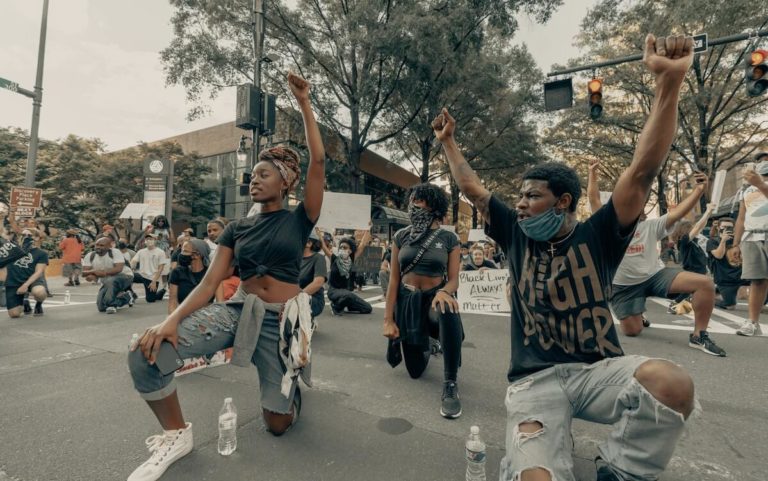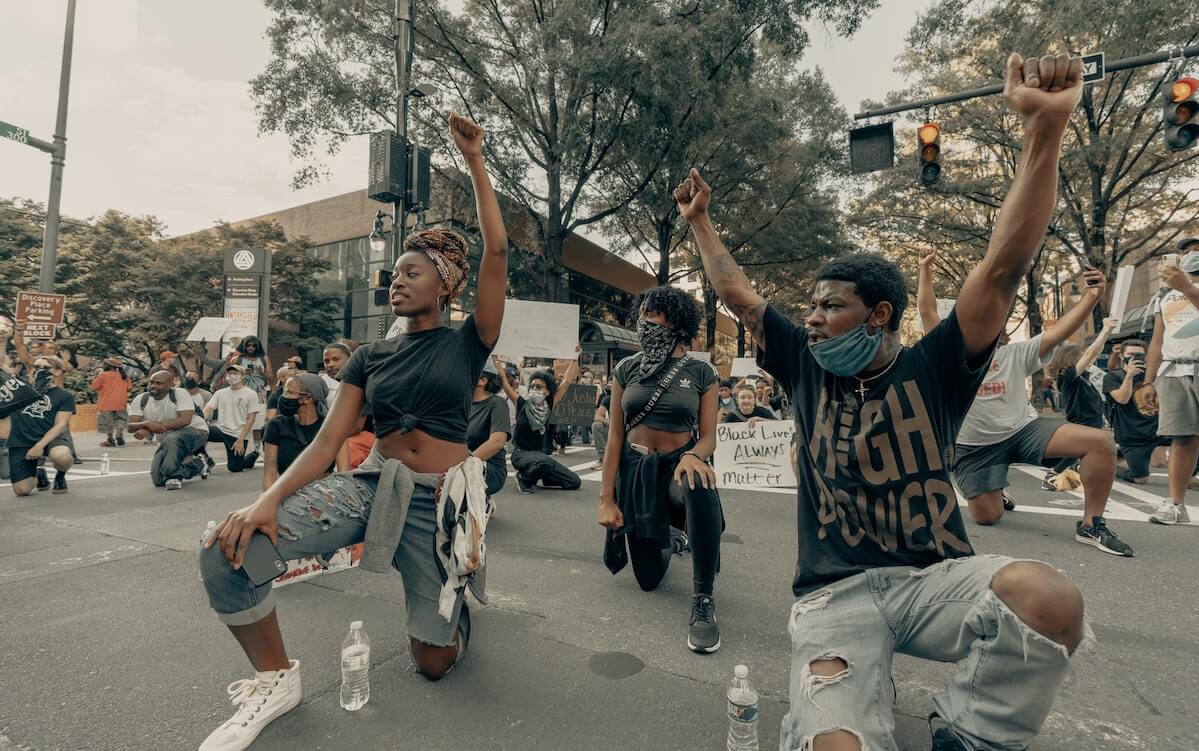Joel Eisenberg is an award-winning writer and producer, and partner in Council Tree Productions, a television development company. He writes and edits a publication for Medium, “Writing For Your Life,” which you can follow here.
50 Ways For Writers to Combat Racism and Make a Difference

How our gift of writing can enhance our protests.
By nature, writers are as capable of being change agents as anyone. It is nonetheless a fact that our expressions of race relations and other social issues comes with certain degree of risk. The idea is to combat social ills while not inadvertently (or otherwise) spreading intolerance.
We have all seen recent examples of artists persecuted for their views. I am not writing to that here, though I will address it in a point below.
I am writing to the fact that we can fight the scourge of racism together.
A bit of a background is in order so you better understand my own views on the matter: I was born in Brooklyn, New York’s Sheepshead Bay Projects in 1964. My neighborhood was mixed. My friends were primarily black. I’m Jewish. I was raised to consider everyone an equal, regardless of skin color or sexuality, while respecting and appreciating their differences.
With that understanding, here are my 50 points …
- Writers write. During breaks from your screenplay, write a blog or online article expressing your honest thoughts on racism, such as the one you're reading now … from a fellow screenwriter.
- Share your thoughts on social media. Link to your articles.
- Incorporate positive racial elements in your work.
- Openly champion diversity in all facets.
- You are Hollywood. You are indie film and television. Remember that. If you receive a gig or a writing job, write to the difference you want to make. If you attain financing for a film, ditto. When people say, "Hollywood should do more to fight racism," recognize that they are in effect speaking about you.
- You're a writer. You're also a human being. IF you can get on the frontlines of a local protest, do so. Be clever writing your own sign. That's not sarcasm. Be noticed. Make your statement.
- Literally use your voice. Noted, many writers are introverts … but so are many other artists and businesspeople. Speak, if either on Zoom or Skype now or in-person later. Present yourself as a screenwriter and send an email to various film-related organizations, including online conferences and festivals, asking if you could address some of said entity's membership as a guest speaker.
- Your writing is, in part, your brand. Define your brand further by strategizing not only how you can combat racism, but also how to encourage others — including other writers —to pick up the fight as well.
- a) Encourage diversity in your work, and b) Understand diversity is not the same as tokenism. It is our responsibility to create meaningful content in which the story is key. If your story encourages use of diverse characters — meaning persons of color, or persons of a gender or sexuality that you do not share, or another class not representative of you as the writer— then incorporate them. If, however, your work does not encourage diversity, the risk you take by such incorporation is your characters may read as if they are homogenous and incorporated for the sake of doing so. As an example, if you are white and straight, and your diverse characters read and sound like Caucasian heterosexuals, your may be employing tokenism, not diversity, in your work. Again, story is key, and your diverse characters must come across as honest.
- In the same spirit, research is an absolute must for any writer. Case study: I recently wrote a television project. The lead producer wanted a transexual Hispanic character in the mix. I was happy about that for diversity's sake, and the fact that it posed a challenge for me as a writer. I spoke to several trans men and women, and I was referred in a few cases to their case workers or psychologists. I heavily researched, and returned with what I believed were the beginnings of a full-bodied and honest portrayal. I returned to the producer, and asked, "What is your idea to best showcase the character, and tell me again why you wanted to include a Hispanic trans character specifically." His response, frankly, was unacceptable to me: "Trans is the in-thing. Everyone needs a trans character in their work. We make her Mexican, we did our job." He said he appreciated the work I did, but just "put her in the story." After I sat with him and explained the issue, as elucidated in #9 above, he thanked me for staying on top of the issue. He understood; I asked him, "So why do you understand?" I was being bold, but it was necessary. For the record, he's a black man. He told me he realized that for contemporary dialogue from some of the black high school-aged characters in the project, I had met with black high school students which he loved. He did not at first make the connection. It's all about honesty of the portrayals.
- Be consistent on your social media. Do not become another example of a writer who is fired from a television show or movie for past racist and/or sexist remarks on Facebook, Twitter, Instagram, etc. Be aware of your words. Do not self-censor, but realize your work, as said earlier, has repercussions. Those risks are yours.
- Treat your written characters as you would want to be treated.
- If you plan producing your own work, hone in on your responsibility for working with the casting department for diverse portrayals of diverse characters.
- "Say Their Names." If your work reflects real life, say the names of those you portray. Your First Amendment rights allow portrayals or mentions of figures who have become public. If the figure is not public, or if press has not covered the individual, you must attain permission from the person or family for either a portrayal or a mention, in the event the individual is deceased.
- For research purposes, watch films and television that have been acclaimed for their portrayals of diverse characters.
- For research purposes, read books that have been acclaimed for their portrayals of diverse characters.
- For research purposes, consume any media that has been acclaimed for its portrayals of diverse characters.
- Study movements, such as Black Lives Matter.
- Try to put yourself in the position of a discriminated class. This will aid immensely in the verisimilitude of your writing.
- Promote your work. Many screenwriters, and writers in general, are loathe to self-promote. a) You should do it anyway to call attention to your work, and b) If you are combating racism and other social ills in your work, others need to be aware of your efforts.
- Meet as many people as you can, of diverse cultures, religions, races (my personal consideration is we're all part of the human race, though ignoring what makes us different is a mistake for a writer). Speak to everyone. Learn from them.
- Be sincere in your writing goals. Writing anything "for the hell of it" can certainly be meaningful to the practice of your craft, but likely not beyond that.
- Appreciate the fact that if you are not a member of a minority or a discriminated class, you do not know all there is to know.
- Discrimination, if you have not experienced it, is immensely painful. These words may sound like common sense, but I stand by them. An example is my own life as a Jew who experienced anti-Semitism when I was young. My last name told that tale. Imagine now if you are a young black man or woman who fears walking down the streets and encountering a police officer. Whether you agree that this is a valid fear or not, the recent death of George Floyd has certainly — once again — brought this reality into the open. Unless you have experienced such fears yourself, you don't know.
- One's perspective is one's reality. Widen your reality by widening your perspective.
- Life experience will aid immensely in your writing. Live and learn.
- Escape from your comfort zone. Mingle. Talk. Experience.
- Listen to the words of minority leaders. Do your level best to understand their voices, and their impact.
- Metaphor is an immensely powerful tool. Create metaphors in your work to call attention to the destructive power of racism. As a perfect example of metaphorical work that commented on and criticized social issues, watch random episodes of "The Twilight Zone."
- Satire is also a powerful tool if skillfully wielded. A selection of the work of Mel Brooks ("Blazing Saddles") or Stanley Kubrick ("Dr. Strangelove, or How I Learned to Stop Worrying and Love the Bomb") is a must to study.
- Work on your open-mindedness.
- Be introspective. Define your own prejudices, and work on them.
- Read up on history, especially racially-provocative history.
- Review some problematic (criticized) pop-culture for further understanding of the issues some take with controversial material.
- Continuing #34, above, never shy away from controversy. A writer must be honest in their voice. We risk repercussions, but we need to continue to explore our own realities.
- Continuing this string, appreciate the difference between shock and impact. Anyone can shock. If you want your work to resonate, consider your goals first and write towards them.
- People are black. People are gay. People are Muslim. People are Jewish. People are trans. Punctuating an earlier point: Ignoring differences in your writing by brushing everyone homogeneously is a mistake.
- When writing about the plight of a particular diverse character, write —which is general advice—in three dimensions. Consider the character's background and life goals as you compose your scripts. What brought them to where they are today, and who do they want to become?
- Protest art is a major aspect of our culture right now. For a writer, the opportunity for such work to be read is greater than ever.
- Ask yourself, "Why will my work resonate?"
- Ask yourself, "Is my work relevant?" Once again, if you are dissatisfied with your answer, return to the well and amend as necessary.
- Ask yourself, "How will my audience identify with the character in my work who is experiencing racism?
- Do you believe your personal views of racism are provocative? If so, express them and explore them in your work through a character.
- Challenge yourself in your writing. Combating racism can be highly effective with honest, challenging work.
- Explore your own tolerances as you write. What makes you impatient? People, situations … anything? Again, learn from your responses.
- Join online anti-racism groups, including pages on social media. Interact.
- Become involved and active in your community. Once more, the entirety of your life experience will impact your writing.
- Be committed to the fight. Do not lose sight of this goal.
- Be aware of daily events, and stay current with societal shifts.
- Finally, I've advised you to be honest. I will close this blog by saying, "Never lie." Disingenuous work will be seen as fake, or forced. You are still building a career. Adapting the words of Steve Martin for this purpose — "Be so good at something you can't be ignored" — making an impact with your work is very possible. Such is your potential. Realizing that potential is your gift.
It is always risky, to use a word I've used above, to openly discuss racial issues without being tagged part of the problem.
My thought is this: With passivity, we are part of the problem. Without honest dialogue, or art, we are part of the problem.
I'm one for solutions. Thanks for reading this long piece. I hope, in my own small way, I’ve touched some of you with this piece.
---
Image Courtesy of Clay Banks, Unsplash. George Floyd protests in Uptown Charlotte, 5/30/2020 (IG: @clay.banks)
Tags
Get Our Screenwriting Newsletter!
Get weekly writing inspiration delivered to your inbox - including industry news, popular articles, and more!



























